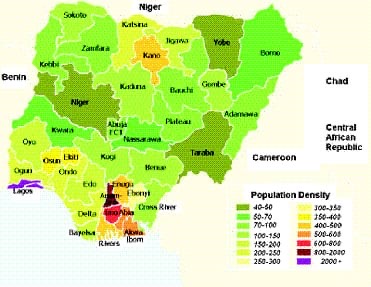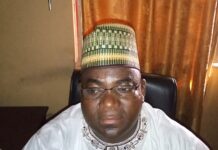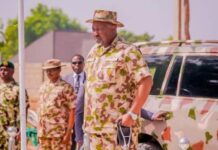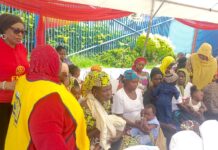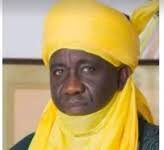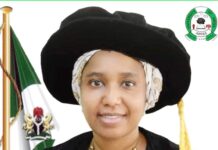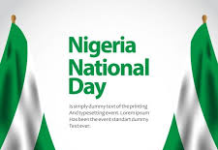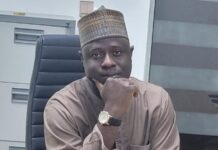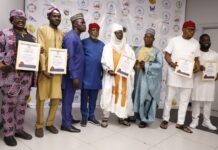Nigeria’s Unending Tears By Ganiyu Abdullahi
POLITICS DIGEST- Precisely, on 1st January 1890, the Royal Niger Company, formally transferred (sold) her administrative rights and powers on the “Niger-Area”, which later became known as NIGERIA (as from 8th January, 1897) to the Crown (the British government) for the sum of 865,000 pounds. Thus, Nigeria became a “product” and “trade commodity.” Moreover, various resourceful kingdoms, emirates and towns in Nigeria were crushed with some of their traditional rulers and people killed, for resisting colonial invasions and enslavement. Approximately 10 million people were believed to have been enslaved from West Africa alone. They were dehumanized and shipped overseas, like cargo. In this vein, Britain, Portugal, Spain, Germany, America and France remained eternally guilty for this monumental crime, which they all committed against humanity.
Those forced into slavery were usually chained, gagged like animals and sold out to European slave merchants on the coast. Whenever ships were not available on the sea, the slaves were kept in some peculiar camps, called “barracoons”, where they were inhumanly confined, before being shipped overseas.
The word “barracoon” is a Spanish word for “barracks” or “hut.” These camps usually marked the entry of previously “free Africans” into permanent enslavement. On the other hand, these camps were otherwise referred to as the “point of no return.” Most unfortunately, some people (slaves) were exchanged for mere European goods like textiles, sugar, salt, jewelries, whiskey, tobacco, glassware, matches and firearms. Thus, the first English man to engage in large-scale of human traffic, along the West African coast was Sir John Hawkins.
According to a report, it was documented that in 1781, a British slave ship (“zong”), whilst on the Atlantic Ocean, the chief crew discovered the shortage of drinking water for those on board. So, he decided to throw 132 slaves into the ocean, with the aim of claiming 30 pounds from their insurers, for each slave that was drowned. In his “satanic” calculation, he believed that if the slaves were left to die of thirst, the loss shall fall entirely on their owners, who bought them. Horribly, all the male slaves were usually chained to each other and kept away from the females, who were left unchained. Thus, the female slaves were always subjected to excessive sexual abuse by the crewmen. Babies born from such “unholy” conjugations between Europeans and Africans were usually stigmatized and called “brown babies.” At the peak of their wickedness, a British reporter submitted that “neither in those days did anyone see any inhumanity in slave trade because Africans were looked upon as animals; only better than dogs and monkeys, because they (slaves) can be taught how to work.” To buttress this point, an elder-statesman, Alhaji Tanko Yakasai (OFR), narrated a shocking experience in his autobiography, when he led a delegation of the Nigerian Youths Congress to the old Soviet Union, few months before Nigeria’s independence. He stated that “the Soviets were touching them in order to confirm if their black skin would rub off on theirs, whilst others among them felt that the Africans were having tails (like animals), concealed under their garments.” They actually believed that Africans are animals. However, it goes without saying that most of the European countries, particularly British and America, owes the foundation of their greatness and prosperity to the negros (blacks), through whom their arts, literature, music and sports have been greatly enriched.
Among some captured slaves was the famous Samuel Ajayi Crowther, who eventually became the first African bishop. He later accompanied the missionary expedition of 1841 to Nigeria. Another prominent figure was Henry Carr, whose Nigerian father was sold into slavery in Sierra-Leone. He later became the director of education in the then Colony of Lagos. In addition, Nigeria’s first millionaire, Candido Da Rocha was the son of a captured slave, Joan Esan Da Rocha, who was captured as a slave at the age of 10 on his way to school in Ilesa (Osun State).
Following their conquests, traditional rulers were cajoled and coerced to sign some obnoxious treaties, which subjected their territories as well as resources (mineral and agricultural) to imperial control. Some courageous traditional rulers, who blatantly refused to bow to these incursions were dethroned and banished; whilst others were killed in the battlefields. King Akintoye of Lagos, Jaja of Opobo, Nana Olomu of Itsekiri, Koko Mingi of Nembe, Eyo of Calabar, Ovenrammwen of Benin, Attah Ameh of Igala and Attahiru of Sokoto, among others, were brutally crushed. Although, many of the traditional rulers were themselves slave merchants. Some of the territories that were bombarded, when they resisted colonial invasions included Lagos (1861); Akassa Raid (1895); Benin (1897); Satiru Rising/Burmi War, Sokoto (1903); Ijemo Massacre, Abeokuta (1914); Adubi War, Abeokuta (1918); among others.
After their “Scramble for Africa” and going by their joint agreement at the Berlin Conference in 1885, the colonialists firmly established themselves and their system of government; imposed their culture; and introduced Christianity, side by side with Western education. On their arrivals in Nigeria, the Wesleyan Methodists settled in Badagry, Abeokuta and Ibadan; the Church Missionary Society (CMS), the largest mission, had her influence in Abeokuta, Lagos, Ibadan, Ogbomoso, Ilesa and Niger-Delta; the United Presbyterians (from Scotland), concentrated in the old Calabar and Cross-River; the Protestants (from Ireland), established themselves among the Qua-Ibos; the Methodists focused their attention in Oron, among the Ibibios. Subsequently, seeing themselves as superior and better human beings to the Africans, racial discrimination prevailed in every facets, both formal and informal. For instance, blacks and whites were not allowed to receive medical treatment in the same hospital. There were “European Hospitals” and “African Hospitals.” Examples were the Creek Hospital (now, Military Hospital), along Awolowo Road, Ikoyi, Lagos, which was exclusively designated as an “European Hospital”; and the present General Hospital on Broad Street, Lagos, which was then known as an “African Hospital.” This discriminative trend was the same in other major cities like Port-Harcourt, Kaduna, Enugu, Calabar and Jos. Moreover, Nigerian/African medical doctors, who had the same or equivalent qualifications with their European counterparts, were designated as “Native Medical Officers” whilst the foreigners were addressed as “European Medical Officers.”
Furthermore, black medical doctors were never allowed to treat any European in the hospitals. In this regard, William Broughton Davies and James Beale Horton (“Africanus”), were the first Nigerian qualified medical doctors, who were undermined and humiliated by the British.
Read Also:
Moreover, social and recreational facilities were also segregated. Hence, there were “European Clubs” and “African Clubs.” For instance, the present day Ikoyi Club, Lagos (the first/oldest recreational club in Nigeria) was reserved exclusively for only the Europeans. The few Nigerians that were usually found around such clubs were the ball-pickers, gardeners and stewards. Infact, it was an offence for a black man to be seen loitering around the European Reservation Areas, which were re-named as Government Reservation Areas (GRAs). Besides, most of the domestic servants of the colonialists were not allowed to marry in order to prevent them from raising children whom the Europeans arrogantly believed would intermingle/play with their kids. Upon the departure of the ‘enslavers’ from Nigeria, all the European Clubs were re-named as “sports clubs” while all the former African Clubs were designated as “recreational clubs.”
At the peak of this ugly situation of colour and social discriminations, Nigeria’s front-line nationalists, under the umbrella of the United Front Committee, led by Sir Adeyemo Alakija, jointly rose up to fight against colour bar in Nigeria in 1947. It happened that a Sierra-Leonian, Mr. Ivor Cummings, who was an assistant director of the colonial scholarship office in London, had an assignment in Lagos and arrangement was made in advance for him to lodge at the popular Bristol Hotel, along Breadfruit Street, Lagos. But the hotel turned him down on his arrival, simply because according to the hotel’s policy “blacks are not allowed” to be served or lodged in the hotel. This development led to an uproar. On this ground, the nationalists sent a delegation to meet the colonial governor, to demand for an immediate end to colour bar and the expulsion of the Greek owner of the hotel from Nigeria. Thereafter, the governor promulgated an Order-in-Council, making it a punishable offence for anyone to discriminate in any public or licensed premises. Thus, Nigeria became the first country in the world, under imperial (foreign) power, where colour bar or racial segregation was legally barred.
Today, it is very pathetic that the multitude of Nigeria’s “accidental leaders”, continue to subject the citizens to the same sordid and discriminative encounters, which our first generation nationalists fiercely fought against, until the oppressive and over-zealous colonizers finally left Nigeria. Sadly, our so-called leaders do not make use of any of the shabby facilities, which they exorbitantly provides for the masses, most especially public hospitals and schools, as well as our bad roads, Without doubt, majority of those hanging themselves in leadership positions are deficient in morality, humanity, competence and patriotism, which they always canvass to the masses.
Not until 1943, the British had no confidence in the administrative capabilities of educated Africans; not even those who graduated from some of their best universities, like Oxford and Cambridge universities. They never allowed any Nigerian to rise to the executive cadre in the civil service and they were not also involved in the decision-making process of government. A good example was late Dr. Nnamdi Azikiwe, one of Nigeria’s foremost nationalists, who later became Nigeria’s governor-general and president. He had a brilliant educational career in both the United Kingdom and America. In 1934, whilst in the United Kingdom, he sought to be included in the British team to the Empire Games, but he was denied the privilege, simply because of the pigment of his skin. On a similar ground, another foremost nationalist, Sir Francis Akanu Ibiam (later, governor of the defunct Eastern Region, from 1960-1966), in his vehement protest against rising issues of colour discrimination in Nigeria, angrily returned his knighthood medal to the British Crown; and dropped his baptism name, Francis. Thereon, he chose to be simply addressed as “Akanu Ibiam.”As at 1933, African soldiers, enlisted into the West African Frontier Force (WAFF), were randomly flogged by their British masters. Interestingly, during the Nigerian/Biafra War, a renowned boxer, Richard Ihetu (“Dick Tiger”), decided to hang his boxing gloves to enlist in the Biafran Army, to fight the Nigerian government. In order to register a strong protest, against Great Britain’s support for Nigeria during the war, he returned his medal as a Member of the British Empire (MBE) to the British government.
Another bold resistance was led by one of Nigeria’s first generation freedom fighters, Mojola-Oluwa (“Mojola”) Agbebi, who discarded his English name (David Brown Vincent) on 24th August 1894. Thereon, he stopped wearing English attires. Even when he visited Europe, he wore only African dresses or his priest’s robes, until he died in 1917. As a clergyman, along with Rev. Moses Ladejo Stone, they both quit the First Baptist Church, to form an indigenous church, the Native Baptist Church in 1888, at the peak of incessant racial discrimination, perpetrated against black clergymen in various churches, across southern Nigeria, where the seed of Christianity was first planted. His courage and nationalistic posture inspired Samuel Ajayi Crowther to translate the Bible into Yoruba language. He later founded Ebenezer Baptist Church, Lagos. To fully demonstrate his vehement resentment, he banned the use of English hymns for the promotion of indigenous hymns in the church.
As part of their humiliation strategies, the colonialists made it mandatory that any address (verbal or written), to be directed to them must be prefixed with “sir”, irrespective of the age or status of the whiteman, being addressed. A researcher once interpreted the word “sir” to mean – “slave I remain.” Moreover, the arrogance and brutishness of the colonialists compelled Rev. Israel Oludotun Ransome Kuti (Fela Anikulapo’s father), to out rightly ban the recitation of British (colonial) anthem in Abeokuta Grammar School, when he was the principal (1932-1950). As a matter of grave concern and determination, he composed an indigenous anthem, titled – “Abeokuta Ilu Egba (Abeokuta – The Egba’s great city)”, as a replacement for the British-imposed anthem – “God Save The Queen.” To further resist colonialism, another great nationalist, Mazi Ojike Mbonu, aggressively canvassed for “cultural nationalism.” Thus, he always urged the people to “boycott the boycottables”, as far as European life-styles are concerned. He consistently advocated wearing of traditional dress to offices and serving of palm-wine, instead of whiskey, champagne or beer, at both private and official events. He ate and encouraged eating of solid meals (eba, amala, fufu,) with bare hand, instead of the colonized usage to fork and knife. He replaced his suit with ‘agbada’ and encouraged civil servants to also go to their offices in native attires. His idea was that the attachment of Nigerians to British culture was another form of enslavement; thus, asserting that Nigeria’s customs and traditions were as good as those of other nations.
Another courageous Nigerian, who went through the thorns of racial discrimination was David Oguntoye, who took the risk to travel to the United Kingdom by hiding inside the ship, just for him to volunteer to serve in the Royal Air Force, during the World War II. But he missed the opportunity, as he was still in the military school, when the war ended. In the course of his career, he got into a committed relationship with a white lady, Dulcie King, who was also serving in the Royal Air Force. Whereas, inter-racial marriages were not permitted in Britain then, most especially in their military. All tactical and administrative attempts to separate them, even to the extent of attacking David, failed. Eventually, they both decided to resign their appointments, as senior flight officers. They later got married on 16th November, 1946, despite stiff opposition from the lady’s parents. On this ground, she denounced her British citizenship and both of them returned to Nigeria, after undertaking a course in law in the United Kingdom.
Interestingly, Dulcie Adunola Oguntoye eventually became a magistrate, High Court judge and the first woman to sit on the bench in Lagos State Judiciary. She also emerged as Nigeria’s second female judge, after Modupe Omo-Eboh.
Against the intent and spirit of the Universal Declaration of Human Rights, it is very pathetic that many innocent Nigerians, who were compelled to “checkout” of the country on the ground of survival, are today, being grossly abused and inhumanly treated by their host countries, simply because they are blacks (Nigerians). It is equally very disturbing that some foreign multinationals, operating in Nigeria still continue to dehumanize and trample upon the fundamental human rights of Nigerians in their work-force; and they are left unchecked. Without doubt, the spirit of patriotism is killed in the citizenry; when the government is not proactive enough to defend her citizens against external exploitations and molestations.
Comrade Ganiyu Abdullahi is a concerned patriot, activist and author. (08055048925/[email protected])

